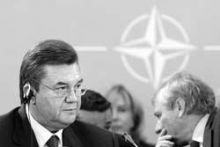It looks as though Ukraine has embarked on a new stage in its relations with the North Atlantic alliance after Viktor Yanukovych’s visit to Brussels. The impression is that relations between Kyiv and Brussels will be developing mostly according to the dictates of Ukraine’s prime minister and his view of the way relations should proceed between Ukraine and the defense bloc, which the majority of the population in eastern Ukraine considers a hostile one.
As confirmation, Yanukovych announced in NATO headquarters that Ukraine is not prepared to join the NATO Membership Action Plan, owing to a low level of support from the ill-informed Ukrainian populace for Ukraine’s accession to the alliance. But at a joint press conference with Jaan de Hoop Scheffer, the Ukrainian prime minister announced the intention to concentrate on strengthening partnership relations with the alliance through intensified dialogue and annual target-oriented action plans. “We are now launching a new stage of relations with NATO. In strengthening this cooperation, we will be doing our best to convince the Ukrainian people that there is no alternative,” he noted.
However, the prime minister’s next phrase, about separating the membership question from normal and mutually advantageous cooperation with NATO, muddied the waters. “This is a key reference point for relations with the alliance,” he added.
Yanukovych’s statement sparked disappointment and even indignation among some Ukrainian politicians. The Our Ukraine parliamentary faction branded the prime minister’s statement that Ukraine is not ready to join the Membership Action Plan as a violation of the political agreements enshrined in the Declaration on National Unity. But it should be recalled that the Party of Regions insisted on withdrawing from clause from the declaration, stating that Ukraine should join the NATO Membership Action Plan as early as this year.
The Ukrainian People’s Party has called upon President Viktor Yushchenko to ensure that Ukraine’s foreign policy be irreversibly aimed at Euro- Atlantic integration.
President Yushchenko considers Yanukovych’s statement politically motivated, erroneous, and one that runs counter to national interests. He recalled that, under the law “On the Foundations of National Security” passed on June 19, 2003, integration into the EU and NATO, including full- scale membership, is a foreign policy goal.
“Today, the president, the prime minister, and all political forces are supposed to be guided by the law on basic national security...which envisions political integration, including full membership, into the EU and the Atlantic defense bloc, so I would like to re-emphasize that this is the basis, the precept, for shaping our political course in this matter,” Yushchenko said.
Ukraine’s Minister of Foreign Affairs Borys Tarasiuk takes a dim view of Yanukovych’s statement. “This message is negative in that it is postponing the resolution of a fundamental question of Ukraine’s development. It is no exaggeration to say that many people in NATO were disappointed by this message. Many positive things have been completed in the plan for nudging Ukraine closer to NATO membership criteria, so I would not like to see these achievements wasted,” Tarasiuk said.
The foreign minister considers that the head of state has enough leverage to keep Ukraine’s foreign political course intact. According to the minister, one of these levers is the National Security and Defense Council whose decisions are binding on all officials. Ukraine’s Minister of Defense Anatolii Hrytsenko also said that Prime Minister Yanukovych’s statement was unfounded and that Ukraine-NATO cooperation will not cease.
Meanwhile, representatives of the anti-crisis coalition maintain that Yanukovych did not betray the principles of the Declaration on National Unity when he said Ukraine was not ready to join the NATO Membership Action Plan. A leading member of the Party of Regions, Yevhen Kushnariov, points out that the declaration does not contain any pledges about signing this plan, only the necessity to expand cooperation with NATO, which Yanukovych confirmed in Brussels.
Speaker of the Verkhovna Rada Oleksandr Moroz also supports this point of view. In an interview he said that Yanukovych did not infringe the declaration. “The content boils down to developing mutually advantageous cooperation with NATO, while membership is subject to a referendum, after some procedures have been implemented,” he said.
How do Ukrainian experts assess Yanukovych’s statement that Ukraine is not prepared to join the Membership Plan? What will the new stage in Ukraine-NATO relations look like? Have hopes for Ukraine’s NATO membership been thwarted for good? Who in Ukraine can define our foreign political direction?








